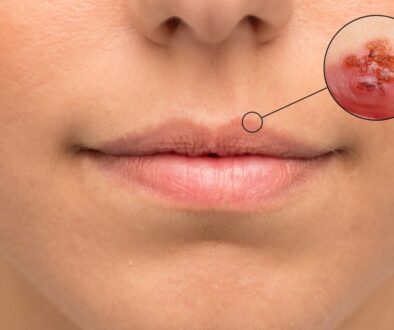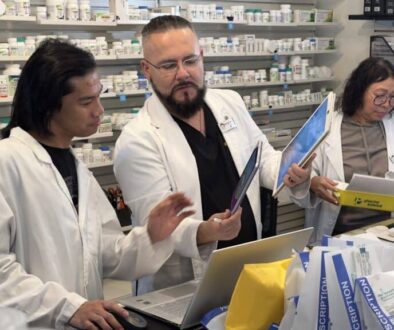Oral Herpes Labialis (Cold Sores)
You might experience a few of the following signs:
- rash or lump around the lip’s edge.
- presence of transparent, gooey fluid surrounding the rash
- Rash symptoms include tingling, burning, and itching.
- Skin that is red or irritated around the rash.

HOW TO TREAT A COLD SORE (HSV)
Herpes labialis, also known as cold sores or fever blisters, is caused by the herpes simplex virus (HSV). The virus is highly contagious and can be spread through direct contact with an infected person or through contact with an object that has the virus on it. So be considerate if you have an active cold sore- don’t share your utensils, your can of Perrier or of course kiss someone!
Treatment for herpes labialis typically involves antiviral medications, which can help to reduce the duration and severity of outbreaks.
Commonly used antiviral medications for herpes labialis include acyclovir, valacyclovir, and famciclovir. These medications are usually taken orally and can be used to both treat an active outbreak and to prevent future outbreaks.
If your assessment or history points to an awakened cold sore episode, Mister Pharmacist will probably issue you a very standard prescription of Valacyclovir (2x 500mg tablets) for 2 doses and an ointment of Acyclovir ointment to be applied 5 times a day.
It is important that you contact Mister Pharmacist the morning you feel that the outbreak is making an appearance… -you know – that familiar tingling feeling. Please dont wait more than 3 days to start a treatment since at that point the virus has entered back into your lymph nodes. At that point your sore has probably crusted over and you should watch not to pick at it otherwise it will get infected with bacteria and will need potentially an antibiotic ointment.
In addition to antiviral medications, there are several things you can do to help alleviate symptoms and prevent the virus from spreading:
- Apply a lip balm or cream that contains sunscreen to help protect your lips from further sun exposure, which can trigger outbreaks
- Apply a lip balm or cream that contains a moisturizer to help keep your lips hydrated
- You have probably seen recommendation to apply a cream or ointment containing a numbing agent, such as lidocaine, to help alleviate pain and discomfort. Might work. Might not.
- Apply a cream or ointment containing a drying agent, such as calamine, to help dry up the blister.
- Avoid touching or picking at the sore to prevent the virus from spreading
- Practice good hygiene by washing your hands frequently
- Avoid sharing personal items such as towels, lip balms, or lipsticks and like mentioned before.- no saliva exchange during the first 72 hours of the outbreak.

Red Flags that may require you to see a doctor first
Red eyes or eye painBlister/sore present on/around noseSore present for more than 2 weeksMore than one blister/sore (1+)More than 6 episodes a yearFirst time experiencing a cold sorePoor/weakened immune system (could be from medication or medical condition)Infection suspected (very red/swollen and/or pus)Fever, sore throat, swollen lymph nodes, muscle aches, or generally feeling unwellAge < 12 years oldIt’s important to see a doctor if you have a persistent or recurrent outbreak, or if your symptoms are severe. It may be a symptom of extremely weak immune system and you need to know what else is going on!

